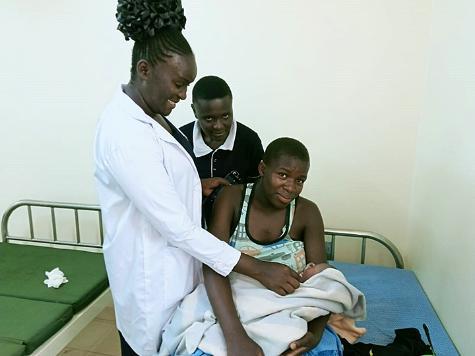Improving The Kenyan Maternity Process
Local nonprofit uses Touro experts to reduce infant mortality rate and the maternity process

Childbirth was, rightfully, referred to in the past as the “Miracle of Life.”
Advancements in healthcare and birthing practices in developed nations have made the experience less reliant on miracles and much more routine for the mother and child.
However, in developing countries – particularly remote, rural areas like Sega, Kenya – divine intervention might still play an important role in the outcome of birthing for both mother and child.
The mortality rate at birth in Kenya, according to the United Nations, is about 31 per 10,000 – compared to the US, with about 14 per 100,000. In Sega, the mortality rate is as much as twice Kenya’s national rate.
MPH student Katie Rolan, working jointly with School of Nursing founder and interim assistant director Ann Stoltz, helped bring about some simple but important changes to the community of Sega that have helped improve those statistics.
Rolan and Stoltz worked with a non-profit group, Goal4.org, to bring these services to the women in Sega, with help from a generous grant from the Vacaville and Kenyan Rotary Clubs.
In Sega, the primary health facility, called a dispensary, runs under the guidance of a local health officer – somewhat akin to a Physician Assistant – but isn’t open 24 hours a day like a hospital. The services and supplies are limited and, prior to Goal4.org getting involved, the Sega dispensary had a small maternity ward with one delivery bed.
Education and empathic practitioners can also be in short supply in remote areas like these. Stoltz helped work on Mother’s Education, a type of “What to Expect When You’re Expecting” course done via videos.
“We were able to outfit local volunteers with iPads and a series of videos,” Stoltz said. The videos covered a range of expectant mother topics, even as basic as breastfeeding. “We had a lot of great success with those videos.”
The final presentation in that series was done in person and that’s when Stoltz realized the full scope of the challenge facing this dispensary.
A major part of the way government funding is distributed in Kenya is to areas of need, meaning areas where there is already some success that can be improved upon with additional funding. Goal 4.org helped outfit the dispensary with indoor plumbing, a shower, and a kitchen, which all had the effect of making the dispensary a more attractive place to give birth – which was key to helping garner more government funding.
“The closest hospital is in Nairobi, which is about 8 hours away,” Rolan said. Many Sega women chose to give birth at home, rather than the dispensary prior to these improvements. “At home births pose a lot of risk factors and we’ve seen that in this part of the country, if you don’t start off in a facility of some type, getting into one is a real challenge.”
Rolan, who is a nurse by trade, sought her MPH degree at Touro specifically to tackle these types of challenges.
“The cool thing about nursing is basically everything we do is public health,” Rolan said.
Along with creature comforts, the dispensary also faced the challenge of a staff stressed by numerous factors – with lack of resources being chief among them.
“The staff is stretched really thin, so they weren’t always as kind to the mothers as they could have been, which is understandable,” Stoltz said. Through a respectful maternity training, the dispensary workers learned greater empathy and communication skills and the birthing experience has improved as a result.
“Word is getting around that this is a kinder, gentler place to deliver,” Stoltz said. Things have improved enough that the dispensary, which hardly saw any births prior to Goal4’s projects, now periodically has to call in the health officer to assist with multiple births.
“It’s just been an incredibly enriching and rewarding experience,” Stoltz said of watching the growth of this dispensary in such a short span.
The work is important for areas beyond Kenya, Rolan said. Establishing a model to be patterned after and potentially scaled up over time was crucial. But remote regions of the world aren’t the only areas where this is a concern.
“This isn’t just a problem in Africa,” Rolan said. “Infant mortality and maternal mortality … it’s an evolving issue for sure.”
